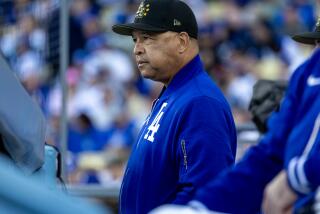Commentary : Don’t Look for Green to Enrage Steinbrenner
- Share via
Question: Will there be conflict between Dallas Green and George Steinbrenner?
Answer: Is it all right to answer one question with another question? Why not?
In this tale, it rained and rained in Cincinnati, and in the leaky press box at old Crosley Field a young baseball writer asked of veteran Tom Swope: “Do you think it’ll stop?”
And the veteran paused for just a moment and replied: “It always has.”
Of course, as summer follows spring, there will be rumblings between this owner and any manager. That’s a lesson of history. But not yet.
There has been some disagreement and some surprise on Green’s part in the last few days, but the new guy is Dallas Green and not Billy Martin. Now, if Billy were the manager, a disagreement immediately escalates. It’s interesting to muse on how history would have been changed if Green and not Martin had managed the 1977 and ’78 Yankees.
“I don’t know we have a disagreement,” Green said from his home in Philadelphia the day after images of disagreement with the boss foamed to the top in war-declared type in recent weeks. It’s anticipation; it’s history.
“That’s not fair,” Green said, and he’s right. Actually, he handled himself quite gracefully, dodging the tank traps and land mines, which is what suggested the contrast with Martin.
“First and most important,” Green said, “I don’t have an ego. Oh, we all have a certain amount, but I don’t have an ego that detracts from my managing, or that puts D.G. ahead of T-E-A-M.” He spelled it. “I preach team and I mean it. Face it, if the team wins, that means I have won.”
Martin was blessed with a team loaded with talent and he managed to thrust himself into every issue and inflame it. He had to demonstrate that he was slickest of all.
Green is a man of considerable personal stature, which is why Steinbrenner sought him and why their conflict is almost inevitable. They have disagreed, but a difference of opinion on the roles of Ron Guidry and Tommy John in spring training is something they can absorb. Green has a sense of diplomacy. As he pointed out the first day he was introduced as manager: “Understand, I was not hired to be general manager.”
He doesn’t seek confrontation. He doesn’t engage in daily ego battles with his stars and the people who hire him. He will take a stand.
He immediately recognized that an aging pitching staff crippled the Yankees last season. Almost every time John pitched, the situation demanded two relievers, and when Guidry was trying to rehabilitate himself, he needed two relievers. That can kill a staff. Green sees his own strength as an outgrowth of his time as a productive farm director of the Phillies. He restocked a depleted system as general manager of the Cubs, too.
He likes developing young players, which has terrified Steinbrenner all these years. The owner talked for years about developing talent and was the first to double the coaching assignments in the minor leagues. He didn’t have the patience to stick with development when there were sure things available just for money. Now Green thinks Steinbrenner has finally concluded he has to grow his own.
But Steinbrenner also loves billboard names, which Guidry and John give him and the young newcomers do not. So Steinbrenner chose to sign Guidry to a conditional contract and to promise John a place to give it one more try. “I don’t think that’s the way to go,” Green said at a promotional party recently. He said he was willing to accept a couple of more names on his list of hopefuls. “I can always add more ‘B’ games,” he said. No big deal. He was even willing to consider that it was a nice link with tradition for the Yankees to reward years of loyalty.
He even agreed with the decision to let Claudell Washington go, although Green thought Washington was going to be the center fielder. “There is no disagreement on Claudell Washington,” Green said. “I certainly wanted to keep him if he was in the salary picture, but I certainly was not going to tell them to pay him the money he was asking.”
Now, if Green thinks he’s being forced to accept Guidry and John on his staff when he is convinced they can’t pitch, there will be real conflict.
Martin and Green talk about pushing players to their utmost, but Martin liked to curry favor with his favorites by hiding their mistakes, permitting and encouraging them to hide in the trainer’s room or players’ lounge, away from the inquiring eye of the media. When the Yankees were full of good players, only the best of them would show their face on bad days. The “he said,” “she said” business emanated from that, but the good ones weren’t about to let the player who made the costly pitch or error stand alone.
The most recent Yankees have been only too eager to hide -- even the best of them. “I don’t believe in hiding,” Green said. “I don’t allow it. I’ll open the lounge. I’ve done it before. I can’t say when.”
If they don’t play hard enough to suit Green, it’ll happen and we’ll know it.
When they don’t play hard enough to suit Steinbrenner, we’ll know it, too. When there is real conflict, there won’t be any uncertainty.
More to Read
Go beyond the scoreboard
Get the latest on L.A.'s teams in the daily Sports Report newsletter.
You may occasionally receive promotional content from the Los Angeles Times.










